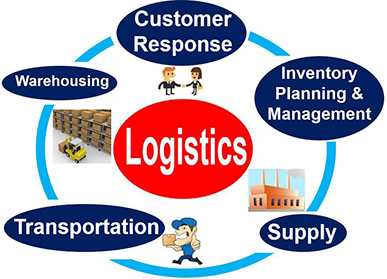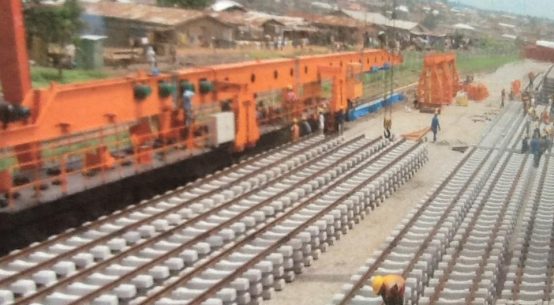
Responding To Global Logistics Trends with a National Logistics Strategy
Logistics and supply chain management play a big role in any economy and are critical contributors to the competitiveness of a country. The demand for products can only be satisfied through the proper and cost-effective delivery of goods and services. Dr. Obiora Madu lays bare the need for a national logistics policy and takes us through what the country will gain from taking that bold step in nation-building.

Nigeria’s main economic activity is the Agricultural sector and on logistics has had a great effect on costs. In addition, most of the freight in the country is transported by road. Furthermore, for Nigeria to grow its market share of various products in the global market, the supply chains need to be world class to ensure effective delivery of goods. These and other aspects of the logistics environment in Nigeria will be presented and major issues affecting logistics costs will be discussed. In addition, reference is made to the recent World Bank report on logistics competitiveness, and comparisons are made other nations on logistics performance.
The importance of logistics and supply chain management to a country’s economy has been highlighted time and again in the recent past. A report by the Bureau of Transport Economics of Australia (BTE 2001) states that the performance of the logistics system has a major impact on the Australian economy: “It affects the cost structures and revenues of Australian producers, their competitiveness in areas such as delivery times and product quality, and the responsiveness of producers to consumer requirements.”
In addition, Tseng, Yue and Taylor (2005) state that due to the trend of nationalization and globalization in recent decades, the importance of logistics management has been growing in various areas. Similarly, Rodrigue, Comtois and Slack (2006) affirm that an increase in freight flows has been a fundamental component of contemporary changes in economic systems on a global, regional and local scale.
More recently a World Bank report on logistics performance states that a competitive network of global logistics is the backbone of international trade and the importance of efficient logistics for trade and growth is now widely acknowledged: “Better logistics performance is strongly associated with trade expansion, export diversification, ability to attract foreign direct investments and economic growth. In other words, trade logistics matter” (World Bank 2010). Similarly, the 6th Annual State of Logistics TM survey for South Africa (CSIR 2010) indicates that the global competitiveness of South Africa is dependent on the performance of the logistics and supply chain sector and that the value that logistics adds to the country should be greater than the costs.
The world’s logistics industry is experiencing great changes
Markets: Rapid expansion of international trade in most regions, and particularly in Asia: many supply chains are now truly global
Expectations: Global competition in product and service markets is driving higher standards and lower costs in logistics supplier markets
Competition: Despite some industry concentration (eg ports) the freeing of transport markets is creating greater contestability in logistics services and sub-markets
Technology: All modes of transport are investing to obtain more efficient, usually larger vessels/vehicles and improved traffic dispatching, monitoring and control capability
Inter-modality: Both standard and specialized containerization continues to grow, facilitating inter-modal transit and multi-modal allocation of traffic
Energy: The expectation of perpetually cheap energy is waning due both to declining fossils fuel stocks and expectation of higher energy taxes in response to global warming
Security: Higher standards of security in freight transport are being sought in all modes, but particularly in international shipping and aviation
Bottlenecks: Logistics services depend heavily on public infrastructure in roads, railways, ports, airports, shipping channels etc: capacity increments are not matching world freight volume growth
WHY NATIONAL LOGISTICS STRATEGY?
The industry is of national importance to trade& development
Logistics and supply chain management play a big role in any economy and is a critical contributor to the competitiveness of a country. The demand for products can only be satisfied through the proper and cost-effective delivery of goods and services. Nigeria’s main economic activity is Oil and Gas and Agriculture and logistics costs impact heavily of these key industries. In addition, most of the freight in the country is transported by road. Furthermore for Nigeria to grow its market share of various products in the global market, the supply chains need to be world class to ensure effective delivery of goods.
The external impacts are significant
The World Bank Logistics Performance Indicators LPI summarizes the performance of countries in the following six areas which capture the most important aspects of the current logistics environment:
- Efficiency of the customs clearance process;
- Quality of trade and transport-related infrastructure;
- Ease of arranging competitively priced shipments;
- Competence and quality of logistics services;
- Ability to track and trace consignments; and
- Frequency with which shipments reach the consignee
Domestic Logistics Performance Index
The Domestic LPI looks in detail at the logistics environments in 116 countries.
- For this measure, surveyed logistics professionals assess the logistics environments in their own countries. This domestic evaluation contains more detailed information on
- Countries’ logistics environments, processes and institutions
- Logistics performance time and cost
- It uses five major determinants of overall logistics performance to evaluate the logistics
- environment and institutions and to measure logistics performance time and cost:
- Level of fees and charges
- Quality of Infrastructure
- Competence and quality of services
- Efficiency of services
- Sources of major delays (timeliness)
INTERNATIONAL SCORECARD
The international score uses six key dimensions to benchmark countries’ performance and also displays the derived overall LPI index. The scorecard allows comparisons with the world on the six indicators and the overall LPI index.
The logistics performance (LPI) is the weighted average of the country scores on the six key dimensions:
- 1) Efficiency of the clearance process (i.e., speed, simplicity and predictability of formalities) by border control agencies, including customs;
- 2) Quality of trade and transport related infrastructure (e.g., ports, railroads, roads, information technology);
- 3) Ease of arranging competitively priced shipments;
- 4) Competence and quality of logistics services (e.g., transport operators, customs brokers);
- 5) Ability to track and trace consignments;
6) Timeliness of shipments in reaching the destination within the scheduled or expected delivery time.
The industry depends on public infrastructure for its success
Infrastructure is defined as part of a structure; material or economic base of a society or an organization. Therefore, infrastructure can be seen as the basic structure that fosters the good performance of cities’, states’ or countries’ essential services. In this sense, for a country to have a good logistics infrastructure system in the different modes of transportation, constant investments from both public and private sectors are needed.
Infrastructure is a critical enabler to economic growth. Logistics infrastructure is the backbone on which the nation marches on. Although the urgency to develop Nigeria’s logistics infrastructure has been realized in the past decade, the task at hand is daunting. Nigeria’s logistics infrastructure is insufficient, ill-equipped and ill-designed to support the expected growth.
Organizations, especially in a competitive and globalized world, require infrastructure compatible with their needs and demands, in order to transmit their products and services to different producers and demand centres in different parts of the globe.
Government policy and administration responsibilities are fragmented
There is a need for coordination. We need a Mega Transportation Ministry which has to absorb the aviation ministry. At a time the world is going for integration, we cannot afford to be disorganized. I am also aware that the ministry of transport has been thinking of a National Transport Commission but I think that what we need is a National Logistics Commission. This will give the commission the breath required to look at all the issues beyond transportation alone.
For our country to continue leading in the 21st Century economy, we need a 21st Century Government. We need a Government that is lean, efficient, and continuously striving to do more with less, ensuring that every taxpayer dollar is used wisely and to the maximum effect. And we need a Government that is responsive to the needs of its citizens and businesses and is willing to embrace the rapid pace of technological innovation underway, ensuring that we remain globally competitive.
Over the years, the Federal Government has become increasingly complex, as agencies have been assigned new missions and duties in their service to the Nigerian people. At times, this has resulted in agencies with duplicative and overlapping responsibilities that have wasted taxpayer resources and made it harder for the public to navigate their Government. This Administration has to work hard to reduce duplication and fragmentation challenges over the next four years.
What should National Logistics Strategy try to achieve?
A national logistics strategy must on a general target higher customer service which should include: Customer responsiveness, Geographic coverage, Delivery time and Reliability of delivery time. It should also consider Frequency of delivery, Safety and security of goods, Protection of corporate image and Value-adding services
In the area of cost, Lower service cost is also a major issue because the availability of these infrastructures at unaffordable cost will amount to no impacts. Things to consider include Transport & storage tariffs, Inventory holding costs, Product damage or deterioration, Pilferage losses, Insurance costs. Other issues that require attention include, Customs and other clearances, Bribes and malicious delays, Social & environmental costs
Logistics strategy should encourage private enterprise and competition
By comparison with transport services, the arguments for either public or private provision of transport infrastructure are less clear-cut. The concerns about the impacts of state – ownership on efficiency also apply to infrastructure.
But other issues can arise which may counterbalance these concerns, for example: whereas most transport services can beneficially be made competitive or contestable, much transport infrastructure either has attributes of natural monopoly (such as rail and waterway networks) or, by virtue of locational advantage, creates significant market power for those who control the prime site in some cases, such as roads.
It is more difficult to recover infrastructure cost directly from user charges than it is to charge for transport services (though in many cases such as ports, airports, airspace, etc., the infrastructure can be a strong foreign exchange earner); its financial returns are often very long term and, therefore, risky.
These risks are often not attractive to private investors without some public funding or public risk-taking, or government policy guarantees.
Where transport infrastructure costs are not recovered directly, there are distributive consequences which may be politically significant and transport infrastructure sometimes involves major planning, environmental, safety or social issues, which some governments (rightly or wrongly) believe warrants the level of public control that ownership can provide.
In many countries, such concerns have reinforced a deeply held perception of transport infrastructure as a part of the public estate which should be provided for the common good, and not as a business for commercial gain.
But, whether based on a reasoned policy trade-off or founded on this more intuitive cultural perception, it is the case that the public sector (including national and local government) should own and operate most of the basic transport infrastructure in most parts of the world.
WHAT SHOULD BE IN A NATIONAL LOGISTICS STRATEGY?
Logistics policy principles
- Public policy objectives
- Roles of public and private sectors
- Roles of markets and of regulations
- Roles of central and local governments
- Principles of industry access/licensing
Audit of current performance
- Benchmarking of service performance
- Benchmarking of cost performance
- Benchmarking government functions (for example, customs performance)
- Research into customer perceptions
- Problems and bottlenecks
Legal and regulatory changes
- New legislation/regulations if necessary
- Amendments to existing legislation or regulations
- Changes to administrative structures to implement logistics strategy
Stakeholder participation process
- Customers of transport & logistics
- Private suppliers of logistics services
- Public infrastructure suppliers
- Government services suppliers (e.g. customs)
- Local government authorities
- Key policy departments
Public infrastructure framework
- Finance and management
- Access rights to public infrastructure
- Pricing and cost recovery policies
- Public infra. investment priorities
- Land-use planning (e.g. for transport corridors or logistics centers)
Monitoring and review mechanism
- Measurable objectives
- Timetable and milestones
- Clear responsibility and accountability
- Public transparency and reporting
- Periodic updating
Credit is given to World Bank for some of the materials used for this article
Dr. Madu, the CEO of Multimix Academy and a recipient of the 2014Nigeria National Productivity Order of Merit Award can be reached by ceo@multimix-academy.com You can follow Dr. Obiora Madu on LinkedIn or on Facebook to gain more insights on the topic.








